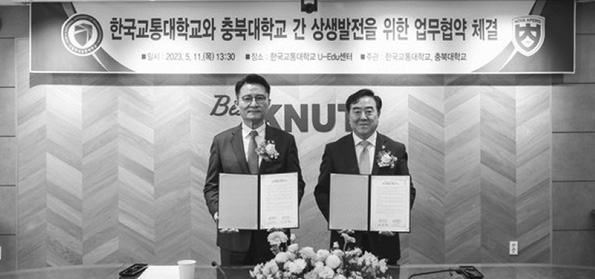CBNU(president Koh Chang-seop) and Korea National University of Transportation(president Yoon Seung-joe) jointly registered the “Glocal University 30.”
In preparation for the collaboration, CBNU held briefing sessions targeting students, professors, and staff to register for the operation while KNUT members voted over 70% in favor of the idea.
The detailed program plans are ▲fulfilling the role of hub of industry-university cooperation in Chungcheongbuk-do ▲removal of the wall of in- and outside of university ▲reinforcement of the university’s international competitiveness ▲governance innovation which will be the base to construct the glocal environment to cultivate talented people who will lead innovation in local settlements.
The registration of both universities in Glocal University 30 is valued in the sense that there is a significance that the national flagship university and transportation specialized university are trying for innovations to remove the wall of in and outside of university and to tear down the boundary between Cheongju-si, Chungju-si and Uiwang-si while seeking to build the unique characterization of both campusses without losing the unique identity of either campus.
Koh Chang-seop, the president of CBNU, said “As it is becoming very important for local governments, local universities, and communities to respond together to solve problems such as the crisis of local extinction, we will establish a regional innovation ecosystem to drive the development of universities and regional innovation growth based on the integrated promotion plan of the two universities.”
Yoon Seung-joe, the president of KNUT, commented “Based on the agreement of all members, we want to be reborn as an innovation-leading university with global competitiveness through bold innovation that breaks down the walls between universities, regions, and industries.”
The government plans to receive applications within this month and announce 15 pre-designated universities next month. Preliminary designated universities will then have to come up with and submit specific action plans with local governments and industries, through which the main designation will be made at the end of September.

However, some are expressing a number of negative opinions in the series of processes in which private universities and national universities are forcibly pushing for integration to promote Glocal University 30. CBT reporters asked students to list some of the many pros and cons and share their opinions through an anonymous survey on integration.
A(College of Humanities, 22)
It is good to unite to draw support at the university level, but I am a little reluctant to integrate like other schools.
B(College of Agriculture, Life & Environment Sciences, 21)
In the long run, the number of students and new students is gradually decreasing, so I think it is better to increase the number of students and continue the existence of universities by integrating them.
C(College of Business, 18)
Integration with other universities is likely to reduce the university’s status or may have a negative impact on students.
D(School of Electronics Engineering, 19)
There is a big difference in standing between CBNU and KNUT in terms of academic achievement and average grades. It seems, therefore, to be a high risk for CBNU to integrate. I am sorry, but I strongly oppose the combination.
E(School of Electronics Engineering, 20)
I think integration is just having one more campus. However, if the campus is dualized in this manner, the conflict between each campus actually intensifies. Even if you look at other universities right now, there are a lot of conflicts and fights between campuses due to integration and dualization. It will be integrated only by administrative names, but it will be difficult to expect a sense of belonging and harmony that students can feel with each other.
F(School of Electronics Engineering, 21)
For me, there is no merit as I am already in my junior year. However, in the long run, for future students who will enter after integration, they may have a bigger variety of choices in their majors, which is an absolute merit for them.
G(College of Humanities, 23)
Nowadays, the number of freshmen is decreasing, and it leads to the disappearance of some special universities and majors. Therefore, it would be good if special universities and departments could survive through the integration of universities.
By Ji Jae-lim
jlim0714@chungbuk.ac.kr
By Kim Chan-ju
g660303@chungbuk.ac.kr


 All
All Campus News
Campus News






 Ji Jae-lim
Ji Jae-lim











